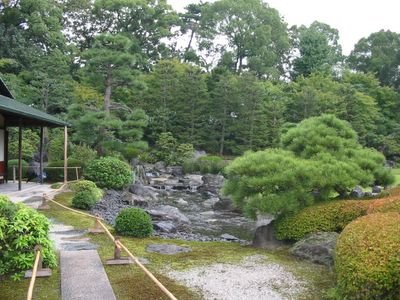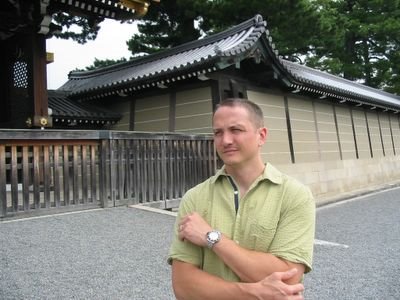I am Bored
If you go to Watanabe Junior High as a foreign assistant English language teacher, this is what you will see. If you come by train and then by bus, you will get off just a few hundred yards from the school’s entrance. Watanabe is large and sprawling building, fairly old and run down. You may find yourself wondering if all the schools in Japan are similarily old and run down looking. You are but a foreigner--with but little experience of living in Japan--and have not yet seen other schools, in other neighbourhoods. You have not yet visited Takatori Junior High School, the flagship school of Yokosuka, where the building sparkles, where the students sparkle…As a result, you do not realize that the school to which you have been assigned is the ghetto school of Yokosuka; you do not yet realize the significance of being told that “Watanabe needs a strong ALT (assistant language teacher) because some teachers find the students hard to handle.”
You approach the entrance, step inside and immediately realize that you must take off your shoes. This may seem strange to you (you are an assistant language teacher; you are a foreigner). This may seem quaint to you (you are an assistant language teacher; you are a foreigner). This may seem like a major inconvenience to you (you are an assistant language teacher; you are a foreigner, and no one has bothered to tell you that indoor shoes must be worn in the hallowed, albeit shabby halls of learning in which you now find yourself).
You are met at the door by a nervous looking, slight woman who greets you in semi-competent English tinted (tainted?) with a mixture of awe and restraint. You don vinyl slippers (too small) and proceed to the teachers’ room, where you will greet your colleagues. At this moment, you still suffer the delusion that they are in fact your colleagues (you are naïve; you are a foreigner), and you look forward, a little nervous but excited nonetheless, to meeting them. Your mind may register the fact that the school’s interior does little to contradict the impression you formed prior to entry: the walls are grimy, the floors are dirty. Fleetingly, you may wonder at this—the dirty floors, that is. How is it possible, when everyone wears indoor shoes?
You enter the teachers’ room and are greeted by the vice principal. His English is minimal, his manner congenial. You suppress the suspicion that he is a little taken aback at your appearance. You had suspected that many Japanese are convinced that English is best learned from blue-eyed blondes from wholesome places like Wyoming or Idaho, or perhaps Minnesota. You wore your hair in a conservative bun, brushed and gelled into submission, all evidence of your unruly black locks concealed. You are wearing a conservative gray skirt and a conservative white blouse. You are wearing brown vinyl slippers. You tell yourself that with your clear, accentless English, your impeccable diction, your warm and congenial manner, with all of these traits in your favour, overcoming the unfortunate accident of being the “wrong colour” (even of wearing the wrong-coloured indoor shoes) will not be a problem for you (you are naïve; you are a foreigner).
You meet the principal. His manner too is warm and congenial – you feel comfortable in his presence, even if you can only understand one-quarter of what he says. He asks you about your background and in the midst of explaining your peripatetic path to Japan, you unwittingly reassure him that you are not really an American black. Oh no! You are special – you are from Canada (and England and Trinidad) and hence much more interesting and complex and less threatening than the caricature of “American black” that is perhaps dancing--like a manic, spliff toting, glock-slinging Bojangles--through his mind. He is now relaxed. You are now relaxed. It is lovely to sit here in the principal’s office, drinking green tea, snacking on bean curd cakes. It is lovely to be told that your Japanese is “joezu”(good), even though you know that this compliment is proffered to any foreigner who bothers to use even a couple of Japanese words. You feel…..lovely.
It is now time to meet the rest of the teaching staff. It is 8:15 am. You are shown to your desk. It is a small, metal desk with just 3 drawers in which to deposit all of the “fun” English language material you have painstakingly researched online and photocopied for use in your mission to transmit English to the youth of Japan. Because you are a gaijin, because you are a foreigner, you do not yet know that your hard work will go unutilized, unrewarded. You have no suspicion (yet) that the paper and the ink (so hard to come by when your printer is a Dell and you live in Japan) could have better served your need to write: You do not yet realize that there is only one English language teaching resource in this school. It is the textbook. It is called New Horizon. It is a series. It is your doom. But you do not know this…Yet.
One of your drawers contains a lap top! Is this for me? You wonder. The teacher beside you grunts as you greet him…He seems less than thrilled to be forced to sit next to “the foreigner” – your proximity is a taint, a blemish to his otherwise unsullied authentic 100% Japaneseness. You suspect that it would not make a difference were you in fact a blonde haired, blue-eyed wholesome girl from Wyoming. Or Idaho. Or even Minnesota. You wonder if the distinction between foreigner and black foreigner is ever really acknowledged in Japan. After all, you hear gaijin (foreigner) often but have heard kokujin (black person, the foreigner part naturally assumed) exactly never.
You wonder, you wonder you wonder….You realize that you perhaps will not become good buddies with your neighbour, this despite, or even because of the fact that your desks are adjoining; since arriving at Watanabe J.H..S. this is the first enlightened thought to enter your gaijin mind. He apologizes as he removes his lap top from your drawer. This act of apology and removal will be repeated over and over again throughout your tenure as an assistant language teacher seated next to a hyper nationalistic Japanese native at Watanbe J.H.S., but at this moment, you are not aware of this fact. You are accommodating. You are warm. You smile and say it’s okay (in Japanese). You are still trying to feel lovely….though perhaps, no longer quite loved.
Now it is time for routine administrative business. The vice principal presides. You lean forward, eager to hear, eager to learn. Thanks to your months of hard study, you can understand; you can hear! This is what you hear: blah blah blah but, blah blah however, blah blah blah student, blah blah tomorrow, blah blah then next week, blah blah blah volleyball, blah blah blah other news.….You realize that you need to study harder, study longer. But you are okay with this. It is a challenge! You are excited! You actually want to learn (and in wanting this, you are unlike most foreigners (or at least Americans) in Japan and so you feel special, superior even…Your self congratulatory posture begins to stink of smugness, but never mind….).
Now it is time for you to speak. You have prepared a short speech in Japanese. You explain that you were born in Trinidad, moved to England at age 2, to Canada at age 12, to New York at age 21. You explain that you studied Japanese at the University of Toronto. You do not explain that you dropped out of graduate school, have struggled since adolescence with depression, and have—even as an adult--occasionally indulged in casual acts of self-mutilation….Some things are hard to explain, even in your own language. You explain that, against all odds (you were once a Marxist!) you married a U.S. Navy sailor, that you relocated to Japan 6 months earlier, that you live in Yokosuka, that you have a few hobbies (reading, writing, doodling, hiking, rock climbing). You fail to mention the one hobby that might actually serve to both shock (the women) and ingratiate yourself (with the men): you fail to mention that you like drinking scotch. You will regret this later, but for now talk of hobbies is over and you are busy apologizing for your terrible Japanese (even later—much later-- when your Japanese is perhaps nearly flawless, you will find it incumbent upon yourself to beg forgiveness for your linguistic clumsiness; you will find it necessary to reassure these peerless natives that as a gaijin, your command of their language actually…sucks). You tell them you look forward to working with them. You tell them you are excited (and in fact, you really are – you are a gaijin; you are a foreigner, and as such, you do not yet realize that they really do not want you in their school, spreading your disease (English) amongst their young ‘uns.)
Your performance – for indeed, that is what it was—is met with polite applause. Behind the palm slapping the sentiment is almost audible to you: “A warm hand for the gaijin who has mangled our beautiful language in her pathetic attempt to communicate with us. A warm hand for the foreigner who fails to realize that it is not just language that divides us but race and culture and the fact that she is not from Wyoming or Idaho or Minnesota and does not have blonde hair and blue eyes! Let us clap now in unison, and make it better than our rehearsal for this moment for which we tried to prepare – except no one told us she was black-- the moment when we would have to greet the gaijin and simulate comraderie and good will!! Oh why?! Oh why has Buddha tested us by sending a black within our midst? A koan is forming! What is the sound of 60 Japanese hands clapping for a black gaijin? It is the sound of titillation and horror! Clap! Clap! Clap!”
The applause has now ended, the show is over. The bell has rung. Now is the time to meet your fellow English teachers. They are all women. This is the moment: you are trapped in that bright moment where you realize your doom. All women! You have never had much luck with “all women.” There are four of them, one of whom is the same who escorted you from the entrance of Oyabe J.H.S. to your doom. She is the youngest and in an uncharacteristically accurate appraisal (after all, you are a gaijin; you are a foreigner) you sense an unequivocal openness and receptivity in her person. One woman is pleased to meet you. She says it and she means it. The other two are polite. They smile. They simper… They compliment you on your performance. You sense that perhaps they hate you. You may wonder if it is because you are not from Wyoming or Idaho or Minnesota; that it is because you do not have blonde hair and blue eyes. You are wrong to wonder this: they hate you because you are the living embodiment of all that they can never be – you speak nearly flawless, accentless English, you are foreign (and hence exciting—at least to their students). You stand before them as testimony to their failure to be truly effective English language teachers. You stand before them as a female Bojangles, a monkey woman who can speak with ease the language they have claimed as their specialty. You stand before them like a freak of nature (you are black) who has somehow learnt to speak the English of (English) kings and of (English) queens. In short, they hate and resent you (you are a gaijin; you are a foreigner).















